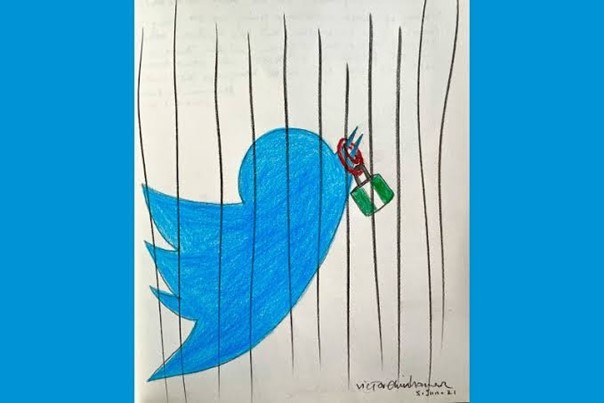#TwitterBan: Small Business Owners Face Losses As Ban Persists
Since its ban in Nigeria on June 4, 2021, some businesses, especially those dependent solely on the social media network, Twitter, have experienced a downturn.

Small and medium scale enterprises which depend on social media platform, Twitter, for sale, have been reeling from the effect of Twitter ban in Nigeria.
Some traders advertise products like fashion accessories, some bake cakes, make artworks, among others, which they display on the platform. Over time, Twitter has become their showroom. But within weeks of Twitter suspension, things changed drastically for these businesses.
Downturn
Twitter based entrepreneurs like Khadeeja Adamu Abdullahi use the microblogging site to market and sell fashion accessories such as bags, shoes, and perfumes, to customers.
But now: “The patronage isn’t as it used to be. Most of my customers are off Twitter because of the ban,” she says. “I used to sell like five items daily. Ever since the ban, I barely sell up to that amount. It has affected my daily expenses too because I spend a lot on data monthly.”
For many Nigerian entrepreneurs, Twitter is a platform they use to reach out to customers, promote their business, and gain new followers who later become customers. Currently, the ban has affected their sales and visibility.
“The ban has a negative impact on my business. From lower sales to lower outreach and so on,” Hauwa Abubakar Goro, who also sells fashion products, lamented.
Another business owner added that “sales drastically became low after the suspension.
Change in the audience affected change in sales. Before the Ban, I was making N25,000 a day. Now, due to the suspension, I only make N10,000 or less per day.”
CocoBean Bakery, an avid user of Twitter for her business, told HumAngle that “as someone who looks to Twitter for daily sales, for full cakes and cake slices, I can tell you for a fact that my weekly total sales have dropped by at least 80%.”
“In a good week we would usually sell anything between 60 to 100 cake slices and maybe 10 full cakes. Last week we could only sell 12 slices and two full cakes,” she said.
Some people prefer to buy what they need online rather than go to the market. Such people, like Esther, are also affected by the ban.
“I’ve always bought my fashion accessories from a vendor on Twitter because I find it easier to just order and get it delivered than go to the market,” she said.
More negative impact, reactions
Aside from the impact the ban has on small businesses, other sectors are also affected. For instance, some banks and telecommunication companies use Twitter for customer service support. The ban will affect swift information and response.
The ban on Twitter in Nigeria came days after the social media giant deleted an ‘offensive’ tweet by Nigeria’s President Muhammadu Buhari, deemed to be ‘genocidal’ because he had threatened violence against separatists attacking security formations and institutions in the Southeast.
NOI Polls estimates that 39.6 million Nigerians use Twitter, 20% of them for business advertisement and 18% in search of employment. Although Twitter is accessible using Virtual Private Networks (VPN) that mask location, experts warn that its unavailability could severely affect the economy.
“Twitter is a platform for creating awareness, so many people have been denied access to the daily awareness they receive through the platform,” Aliyu Sabo of Centre for Information Technology and Development (CITAD) told HumAngle.
In a previous report by HumAngle, a group of Civil Society Organizations (CSOs) described the suspension of Twitter operations in Nigeria as a blow to freedom of expression in addition to shrinking civic spaces.
According to Musa Rafsanjani, the Executive Director of CISLAC, Twitter is not only a place for free expression but a huge market for small and medium businesses (SMEs) and the source of people’s livelihood and income.
“Nigeria has been among the best-performing African countries in attracting investments for technology start-up businesses,” Rafsanjani said.
“Freedom of expression and access to information both online and offline are foundational to prosperous and secure democratic societies,” State Department spokesperson, Edward Ned Price, said in a statement reported by VOA news .
Additionally, according to Netblock, Nigeria loses N2.18 billion daily due to the suspension.
The suspension, now in its third week, is currently causing economic hardship and difficulties for most SMEs who use Twitter as their medium of business and engagement.
In Nigeria, SMEs contribute about 48% of national Gross Domestic Product (GDP), account for 96% of businesses and 84% of employment. This demonstrates the importance of the technological company in supporting businesses in the country.
Support Our Journalism
There are millions of ordinary people affected by conflict in Africa whose stories are missing in the mainstream media. HumAngle is determined to tell those challenging and under-reported stories, hoping that the people impacted by these conflicts will find the safety and security they deserve.
To ensure that we continue to provide public service coverage, we have a small favour to ask you. We want you to be part of our journalistic endeavour by contributing a token to us.
Your donation will further promote a robust, free, and independent media.
Donate HereStay Closer To The Stories That Matter




